#Odinani
Text
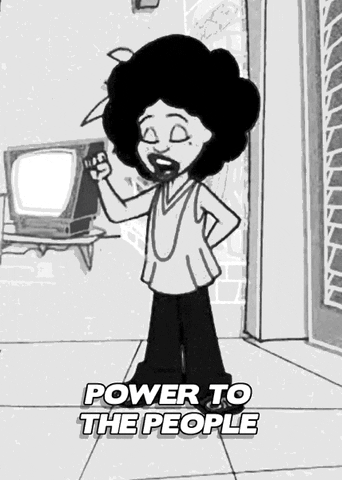
#african#afrakan#kemetic dreams#africans#brownskin#brown skin#afrakans#african culture#afrakan spirituality#oridanla#odinani#epic#epic video#educational#educational videos#Igbo#igbo culture#Igbo spirituality
20 notes
·
View notes
Video
youtube
In Nigeria, Ancestral Spirituality Resurges
2 notes
·
View notes
Text
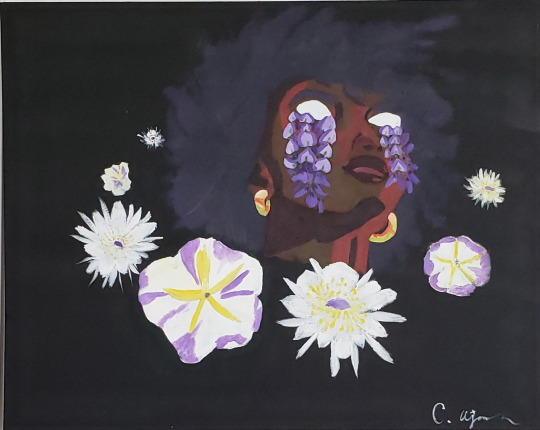
"Onwa"
24"x30", acrylic on canvas
#art#myart#blackart#painting#acrylicpainting#naturalhair#moon#nigeria#naija#moonflower#queenofthenightflower#igbo#odinani#acrylicart#acrylic
4 notes
·
View notes
Photo
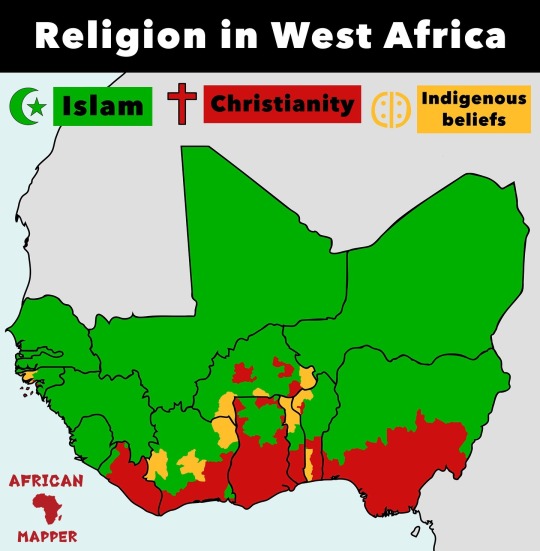
Religions in West Africa
by african.mapper
Islam is the predominant religion in West Africa, it was introduced to the region by traders in the 9th century. Islamic rules on livelihood, values, dress and practices had a profound effect on the populations and cultures in their predominant areas.
Christianity was largely introduced from the late 19th century onward, when missionaries from European countries brought the religion to the region. West African Christians are predominantly Roman Catholic and Anglican, some Evangelical churches have also been established.
Traditional African religions are the oldest belief systems among the populations of this region, and include Akan religion, Yoruba religion, Odinani-Igbo, and Serer religion. They are spiritual creeds that also perform other functions such as preserving the historical and cultural heritage of the people.
76 notes
·
View notes
Text
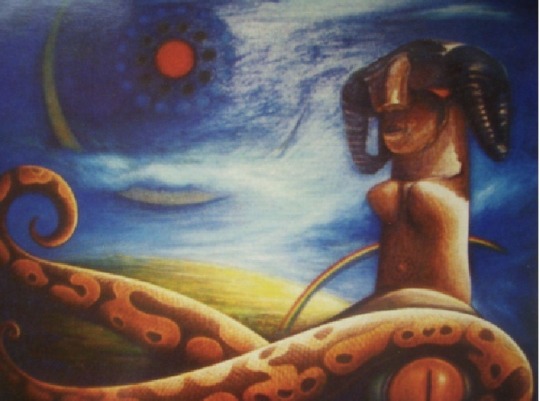
Boniface Okafor. “Spirit of Earth”. Dream Art
My latest inspiration I found while digging further into Odinani. Agwu is everywhere, divinity of science, all forms of knowledge, healing arts.
Coming in touch with your agwu means universal knowledge. Ya Knowledge comes from inside out. We #remembering and the memories of knowledge comfort me.
19 notes
·
View notes
Text
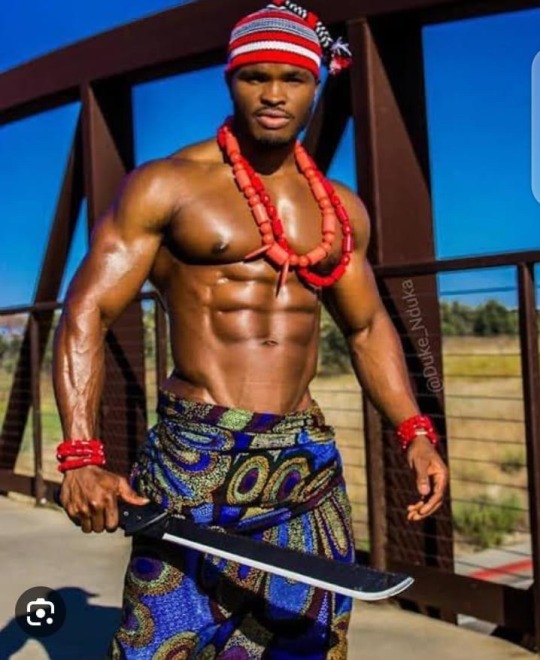
FACTS ABOUT IGBO PEOPLE
*Ndigbo exist as an ethnic nationality in West Africa.
*They are one of the oldest civilizations in the world.
*Igbo language is one of the most spoken languages in Africa.
*They believe in CHUKWU as the supreme being, and adhere to odinani.
*They are hardworking, industrious and highly intelligent.
*They house the highest number of billionaires in Nigeria.
*They were the first people in the world to practice democracy.
24 notes
·
View notes
Text
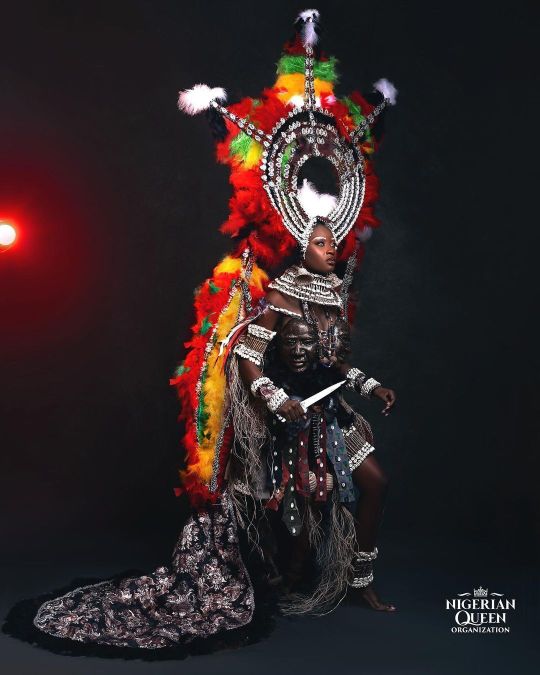
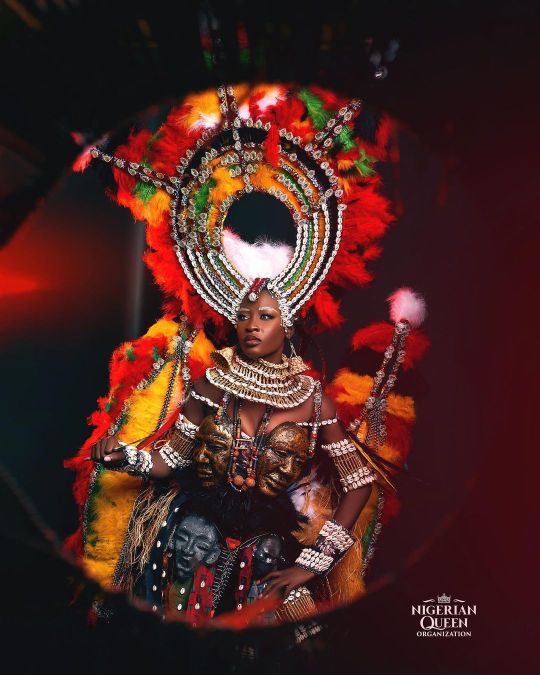

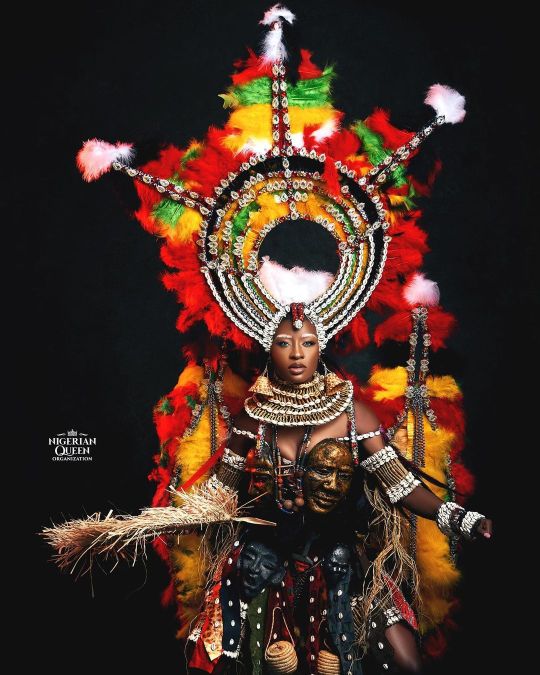
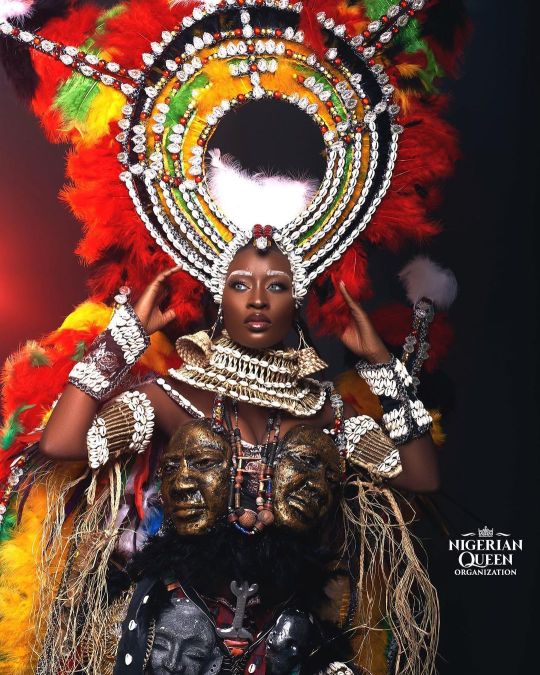
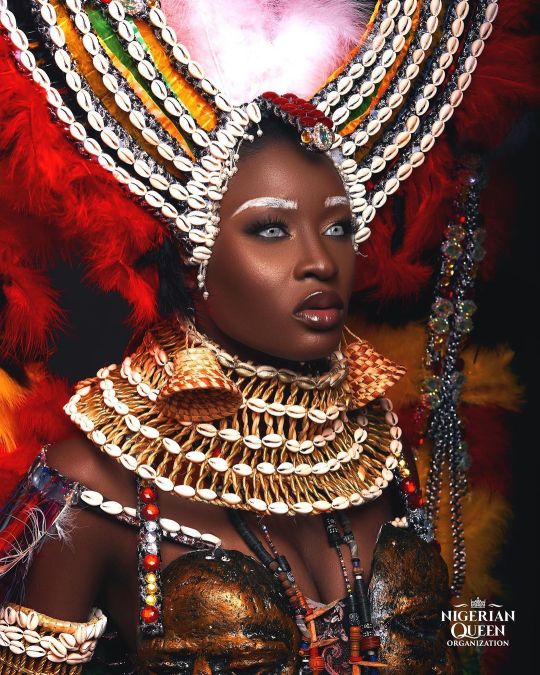
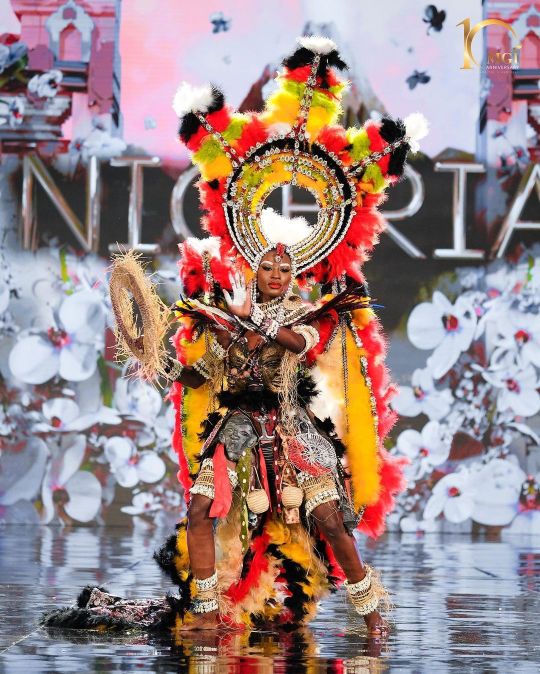
Miss Grand Nigeria National Costume - OYA-ALA
The warrior goddess costume is inspired by the strength and spirituality that we see and feel in two of our greatest female deity - OYA and ALA.
OYA, also known as oya-Iyansan-an, the mother of nine-- from the southwestern states of Nigeria. OYA is the goddess of weather, intuition, psychic abilities, clairvoyance and reincarnation. She is also said to be the guardian of the realm between life and death, her favourite colour is the rainbow -- denoting peace.
ALA: also known Odinala. She is the earth mother goddess of morality, fertility and creativity in the culture of the southeastern people of Nigeria knowns as Odinani. She's considered the highest deity in Odinani, and the name "ALA" translates to "ground" which indicates her powers over the earth.
The ensemble is a coalescence of OYA and ALA, which is a combo of different colors of leather, feathers, mesmerising beads, detailed mermaid inspired and arranged feathers on the headgear, wrist bands, ankle band, and thigh band.
The hand is embelished with cowries, feathers, beads and accessorized short asymmetrical front with flowing trail leather back skirt. from Nigeria we present to you; OYA-ALA.
#miss grand international 2022#miss grand international#national costume contest#nigeria gets what the people want#elaborate costume? A+ performance? detailed description of the meaning? high quality portraits?#they have it all#miss grand nigeria#pageant
85 notes
·
View notes
Text
AFRICAN SPIRITUALITY IN NIGERIA

African spirituality and traditional African religions hold a rich and profound significance in the cultural fabric of the continent, particularly in regions like Nigeria. Rooted in indigenous beliefs and spiritual practices, these religions have played a pivotal role in shaping the lives and identities of African communities for centuries. As you may imagine, the religious landscape of Nigeria is incredibly diverse based on the many tribal groups that inhabit this land.
However, the traditional beliefs have stood the test of time as they are interwoven in virtually every aspect of African culture. These age-old religions remain deeply rooted in the belief that our ancestors continue to guide and protect us. Likewise, deities and natural forces shape our existence in deep and meaningful ways. As such, elaborate rituals and ceremonies are often performed to appease these forces.
Each ethnic group in Nigeria has its own unique customs, rituals, and belief systems. As such, it is vital that we recognize and appreciate them accordingly. Because they have all contributed immensely to the respective people groups in which they serve. Outlined below, you will find some of the more common traditions practiced in this region.
YORUBA RELIGION
The Yoruba religion is a deeply rooted spiritual tradition practiced for centuries. Originating from the Yoruba people of Nigeria, Benin, and Togo, this religion encompasses core beliefs, rituals, and deities that span the globe. This comprehensive faith system incorporates veneration of a Supreme Being, Orisas, and ancestor spirits.
ORISAS
Central to the Yoruba religion is the concept of Orisa, which refers to the various deities or spirits that are worshipped. These Orisas represent different aspects of life and nature, such as love, fertility, wisdom, and prosperity. Each Orisa has its own unique characteristics and attributes that devotees connect with through rituals and offerings.
EGUNGUN
Like many African traditional beliefs, one of the distinctive features of the Yoruba religion is its emphasis on ancestor (Egungun) veneration. Ancestors serve as intermediaries between humans and the astral realm. They maintain powerful influence over events and occurrences in the Earth. As such, they can be called upon for guidance and protection.
One way adherents honor their ancestors is during the annual Egungun festival. During this festival, masked dancers and performers embody the spirits of the deceased, allowing for communication with the ancestors. It is a colorful and lively event with elaborate costumes and drumming designed to evoke the presence of these spiritual forces.
IFA DIVINATION
Ifa divination involves seeking guidance and insight about various aspects of life. It involves the casting of divination tools (including palm nuts or cowrie shells). Thereafter, a priest or priestess interprets the patterns to guide individuals about personal and communal matters.
RITUALS AND CEREMONIES
Rituals also play a significant role in Yoruba religious practices. These rituals often involve music, dance, chanting, drumming, and elaborate costumes. They serve as a way to honor the deities and ancestors while fostering community cohesion.
EVOLUTION
In recent years, there has been a growing interest in the Yoruba religion outside of its traditional African homeland. This directly connects to its inclusive nature, rich cultural heritage, and spiritual depth of the tradition. The growing resurgence of people desiring to connect with their spiritual heritage has positively impacted the popularity and expansion of Ifa into the Western world.
IGBO RELIGION
The Igbo people, mainly located in southeastern Nigeria, follow Odinani, their traditional religious and spiritual belief system. Odinani revolves around the veneration of various spirits and deities, as well as ancestors. It is much akin to other traditional beliefs in Nigeria, though it maintains its cultural background rooted in the traditions of the Igbo tribe.
WORSHIP AND VENERATION
At the core of Igbo religion is the belief in a Supreme Being known as Chukwu or Chineke. Chukwu is believed to be the Creator of everything and holds ultimate power over all aspects of life. The Igbo also believe in many lesser deities or spirits known as Alusi, associated with various natural elements such as rivers, mountains, and forests.
Some of the prominent deities in this tradition include Ala (the earth goddess), Amadioha (the god of thunder and lightning), and Idemili (the goddess of water), among others. Rituals and ceremonies are performed to appease and seek blessings from these deities.
NEW YAM FESTIVAL (IWA JI)
The New Yam Festival is one of the most significant cultural events among the Igbo people. It marks the beginning of the yam harvesting season. It involves various rituals, including the offering of the first yams to the deities and ancestors to seek their blessings for a bountiful harvest.
NRI-IGBO RELIGIOUS SYSTEM
The Nri-Igbo religious system is a form of Igbo spirituality associated with the Nri Kingdom. It has its own set of religious practices, traditions, and beliefs and plays a vital role in the religious history of the Igbo people.
HAUSA-FULANI RELIGION
The Hausa and Fulani people, found in northern Nigeria, have their own traditional religious practices. Their belief system often involves the worship of spirits and ancestral veneration, similar to other traditional religions.
The use of protective charms and amulets is also common in the Hausa-Fulani traditional religion. These objects are believed to ward off evil spirits, provide protection, and bring good luck to the wearer. Charms may be worn as jewelry or carried on one’s person.
Though, it’s important to acknowledge that many Hausa-Fulani individuals and communities have adopted Islam as their primary religion. As such, they often incorporate a syncretic blend of traditional beliefs with Islamic practices. This syncretism varies from one community to another and can lead to a unique fusion of cultural and religious elements.
OTHER TRADITIONAL AFRICAN RELIGIONS IN NIGERIA
Beyond the traditions outlined above, other tribal groups maintain their indigenous belief systems. Below are additional spiritual systems commonly practiced in the region.
Edo Religion (Edo Traditional Religion): In the Edo State of Nigeria, the Edo people practice a traditional religion centered on the worship of ancestral spirits and deities known as “Ogboni.” One of the most prominent deities in the Edo religion is Edo, the god of divination and destiny.
Ibibio and Efik Religion: The Ibibio and Efik people in the Niger Delta region of Nigeria have their own traditional religious practices that involve ancestor worship and the veneration of various spirits and deities associated with water and the natural environment.
Tiv Religion: The Tiv people, primarily found in Benue State and some parts of Taraba State in Nigeria, practice a traditional religion that emphasizes the worship of ancestral spirits and various deities tied to the agricultural cycle.
Ijaw Religion: The Ijaw people, who inhabit the Niger Delta region, have a belief system that centers on the worship of water spirits, ancestors, and various nature-related deities.
Kanuri Religion: The Kanuri people, living in the northeastern part of Nigeria, practice a traditional religion that involves the veneration of spirits, ancestor worship, and the use of amulets for protection.
SUMMARY
Nigeria is a diverse country with a rich cultural heritage and a wide range of traditional African religions practiced by various ethnic groups. These traditional religions are often closely tied to the cultures and histories of the different ethnic communities in Nigeria. Despite the influence of Islam and Christianity in Nigeria, traditional African religions have managed to survive and adapt over time.
Many Nigerians practice a syncretic form of religion that combines elements of traditional beliefs with those of other faiths. Yet, the importance of traditional African religions can still be seen in various aspects of Nigerian society. They influence art forms such as sculptures, paintings, and textiles. They also shape social structures through concepts like kinship ties and community solidarity.
In conclusion, traditional African religions continue to hold a significant place in Nigerian culture. They provide a sense of identity, spirituality, and community for many Nigerians. Likewise, they contribute to the country’s diverse religious landscape.
#african spirituality#african traditional religions#traditional african religions#ifa religion#african spirit#ifa tradition#orisa#orishas#igbo culture#nigeria#africa#black tumblr
6 notes
·
View notes
Text
Practicing Odinani is crazy, a lot of mad individuals. Everything is truly what u make it man
5 notes
·
View notes
Text
youtube
"Arcano y sus Maravillas - Mambo"
부두(Voodoo)교는 서아프리카 종교가 노예무역으로 인해 신대륙에 뿌리내린 종교다. 보둔(Vodun)이란 신적 존재를 섬기기 때문에 '부두'란 이름이 붙었다.
서아프리카에 폰족이 세운 다호메이 왕국이 있었다고 함. 정복 전쟁을 일으켜 획득한 전리품 �� 하나인 '인간'을 유럽 노예무역상에 팔아 이득을 챙겼다. 상식적으로 유럽인이 일일이 흑인을 '사냥'하는 짓만으로 천만 명을 모을 순 없다. '보둔'의 기원 또한 다호메이라고 한다.
노예무역으로 가장 많이 팔려나간 종족은 요루바족과 이그보족이었다. 요루바족은 다호메이에 앞서 오요(Oyo) 제국을 건설했었고, 원래는 다호메이가 오요에게 조공을 바지는 관계였으나 유럽에서 도입한 화승총으로 무장한 전쟁에서 오요에게 압승을 거두며 주도권이 넘어간 듯.
정황상 노예무역은 자국의 이득뿐만 아니라 상대 국력을 약화시키기 위한 일거양득의 전략이 아니었나란 추측을 해 봄.
다호메이가 보둔을 숭배했다면, 요루바는 오리샤(Orisha)와 올로룬(Olorun)을, 이그보족은 오디나니(Odinani)를 숭배했다고 함. 이 중 오리샤는 나중에 브라질 종교 깐돔블레(Candomblé)에 영향을 줌.
깐돔블레가 신대륙 크리올 문화 및 카톨릭과 뒤섞이는 과정에서 탄생했듯, 부두교에도 비슷한 사례가 있다. 보둔을 로와(Loa)라고 부르는 게 그중 하나일 거 같다. 구글 검색 결과로는 '보둔 = Spirit', '로아 = Mystery'에 가까운 뜻이라는데, 여러 로아 중에는 카톨릭 성인도 포함한다.
부두교는 본거지 또한 아이티와 뉴올리언스 두 군데다. 지역간 차이점이 꽤 있다곤 하나 사진, 동영상만 봐선 뭐가 뭔지 잘 모르겠다.
한 가지 분명한 건 한국 무속에서 제일 높은 무당을 '만신'이라 하듯, 부두교의 여사제를 맘보(Mambo)라고 한다는 거. 아이티 크리올 어에서 온 거로 뜻은 '(신과) 대화(=to talk)하는 이'라고 함.
이 말이 어떤 과정을 거쳐 쿠바 댄스 음악 용어로 정착했는지 의문을 품은 지 꽤 오래됐지만 여전히 시원하게 풀리진 않고 있다.
그럼에도 '재즈'나 '땅고'란 말의 기원처럼 전혀 오리무중은 아니다. 역사적으로 최초 '맘보' 음악으로 알려진 거는 주로 단손(Danzone)과 차랑가(Charanga)란 장르를 연주하던 '아르까노와 놀라운놈들(=Arcaño y sus Maravillas)'이란 오케스트라가 1938년에 녹음한 거로 본다.
이 곡은 이 단체 소속의 오르테스 & 이스라엘 로페즈(Orestes & Israel López) 형제가 공동 작곡한 거로, 기존 단손의 일부분을 따로 떼어내 독자적인 장르로 재탄생시킨 거라고 함. 그래서 초기엔 '새로운 리듬(=Nuevo Ritmo)'이라고 했고, '단손 맘보(=Danzón Mambo)'라고 부르다 '맘보'가 됐다는 얘기.
하지만 왜 하필 '새로운 리듬 = 맘보'라고 칭했을까? 작곡자는 맘보가 부두교 여사제란 걸 알았을까? 음악을 들어보면 딱히 가사도 없이 "맘보 맘보 맘보…"만 반복하는 게 마치 "원투 원투…"하며 박자를 세는 말로 쓴 건 아닌지, 혹은 당시 아바나에 유행하던 다른 의미가 있었던 건 아닐지 등등…
1940년대에 들어서며 '맘보 넘버 5(=Mambo No. 5)'의 원조, 페레즈 프라도(Pérez Prado)에 의해 세계적 대폭발을 일으킨다. 그 여파가 한국에까지 전해져 1957년 김정애란 가수가 '닐리리 맘보'를 녹음했고, 맘보 빵, 맘보 바지 등등 아무 데나 맘보를 붙이는 지경에 이른다.
0 notes
Text
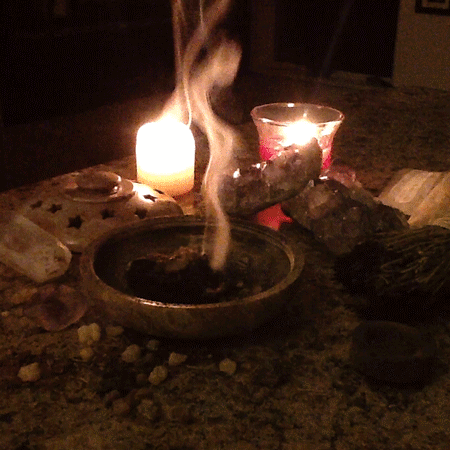
#african#afrakan#kemetic dreams#odinani#brownskin#afrakans#africans#brown skin#african culture#afrakan spirituality#africa#african spirituality#epic video
14 notes
·
View notes
Text
50+ African goddess names and meanings - Tuko.co.ke
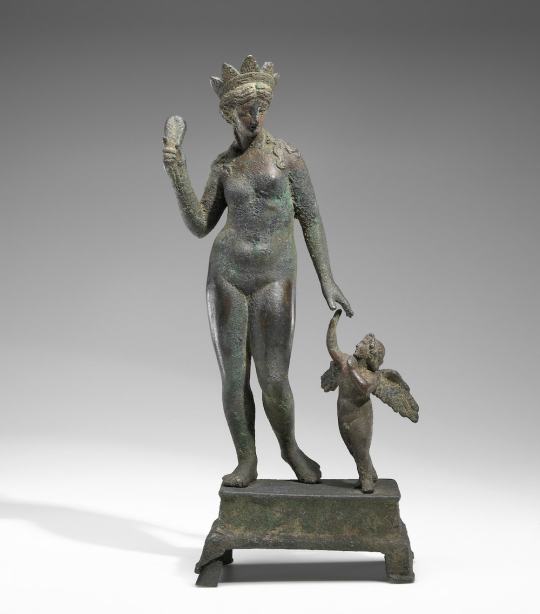
Most communities from around the world believed in various goddesses as their keeper and fate determiners. Most of the goddesses from the early years continue to inspire generations for their irreplaceable roles. Notably, there were deities in charge of every sect of life, contrary to the current monotheism system of belief.
Who are the African goddesses? Ancient African thrived under a robust faith system before westernization, among the most deity-centred parts of life, including love, beauty, fire, rain, and harvest. Goddesses were incredibly respectable, with each bearing a specific name depending on the primary roles. Here are the African mythology goddesses, their names, and meanings.
African goddess of love and beauty
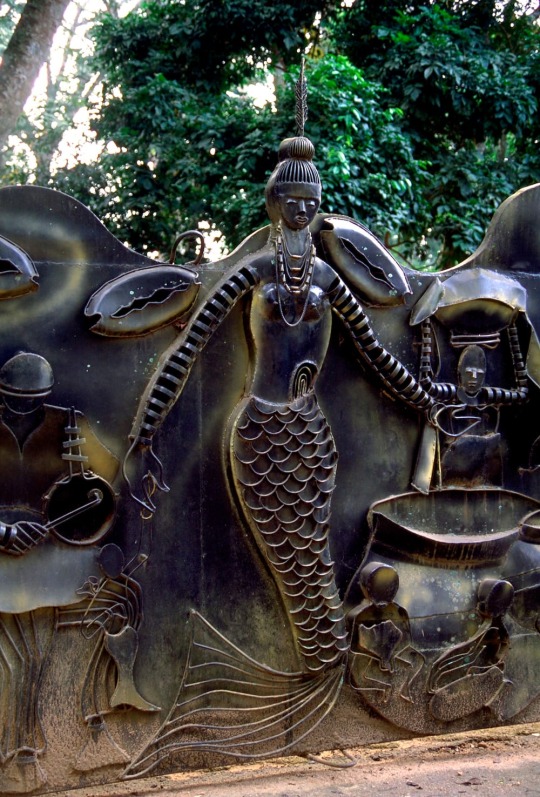
Who is the African goddess of love? Oshun is the African goddess of love and sweet waters. She is a specific deity among the Yoruba people of Nigeria. Oshun is by far the most famous African goddess of beauty.
Creator, sun, moon, stars, or nature female deities
Gleti - She is the moon goddess revered by all in the Dahomey kingdom, particularly the Fon people, Benin. She is the mother of all-stars.
Nana Buluku - The goddess is a supreme creator and mother to the sun spirit Lisa, moon spirit Mawu, and the entire universe, in Dahomey mythology, West Africa. She is also called Nana Buku or Nana Buruku.
Aberewa - Goddess of earth among the Ashanti in Ghana
Aja - Goddess of the forest among the Yoruba
Mawu-Lisa - Creator goddess, Fon people of Benin
Amma - Creator goddess in Burkina Faso and Mali, Dogon people
Asaase - Afua the earth goddess in Ghana among the Ashanti
Faro - Creator goddess in Mali, Bambara people
Kitaka - Earth goddess in Uganda, Baganda people
Nkwa - Creator goddess in Gabon, Fang people
Woyengi - Creator goddess among the Ijo in Nigeria
African goddess of fire
Who is the African god of fire? Africans believed that different goddesses had authorities over the fire.
Oya- Wears a lot of red, is the Yoruba warrior-goddess of fire. She is also the goddess of the Niger river, magic, wind, fertility, and other chaotic, electrifying phenomena.
Morimi- Goddess of fire among the Yoruba
African goddess of fertility and harvest
Asase Ya - She is also famous as Asaase Afua, Asaase Yaa, or Asase Yaa among the Bono people of the Akan ethnic group in Ghana and Guinea Coast. She is the goddess of fertility on the earth, bearing other divine titles such as Aberewaa or Mother Earth. She is second to Nyame (the Creator) in power and reverence.
Mboya - Fertility and motherhood deity in Congo
Mbaba Mwana Waresa - Fertility goddess in South Africa among the Zulu
Ala (odinani) - The Igbo people esteem Ala being the goddess of morality, creativity, fertility, and the earth as a whole. She is the most important deity in the Igbo mythology.
Ahia Njoku - She is a famous goddess among the Igbo people of southeastern Nigeria. The community believes she is responsible for yam, a special treat among the locals.
Abuk - deity of women and gardens in Sudan
Mwambwa - Goddess of desire and lust in Namibia
Inkosazana - Goddess of agriculture in South Africa, Zulu people
African rain, river, sea, and water goddesses
Mami Wata - The goddess is a well-known water spirit displaying male characters at times. Residents of West, Central Africa, and Southern Africa uphold her goddess powers as supreme.
Oba - Obba was the first wife of Shango, the third king of the Oyo Empire and the Yoruba Undergod of thunder and lightning. This African name refers to the river goddess in African mythology. She is the breath of divinity when it comes to the gods of rivers.
Bunzi - Kongo mythology believes in Bunzi as the goddess of the rain. She is the daughter of her great mother, Mboze. She is a coloured serpent well pleased with those who bring their plentiful harvest in her worship
Abena - River goddess associated with wealth symbols of brass and gold
Mamlambo - Goddess of rivers among the Zulu of South Africa
Obba - Goddess of Obba River in Nigeria
Yemaja - Goddess of Ogun River, Nigeria
Olokun - The African goddess of the sea in Nigeria
Yemaya - Goddess of the living ocean
Modjaji - Goddess of rain among the Balodedu people of South Africa
Majaji - Goddess of rain in South Africa, Lovedu people
Mbaba Mwana Waresa - Goddess of the rainbow, South Africa, Zulu people
Egyptian goddess names
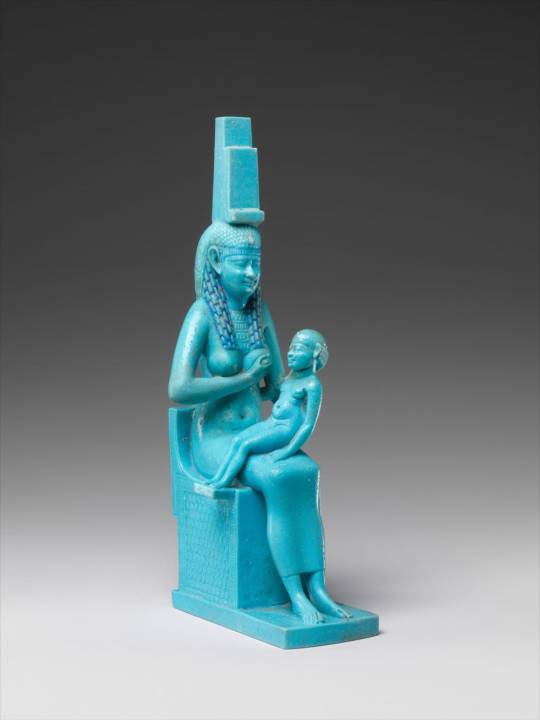
Isis - She is the commonest of all Egyptian goddess names, a respectable deity of the Egyptian pantheon. Isis is the African goddess of wisdom known for her cleverness that exceeds that of a million gods. The image of the goddess Isis suckling her son Horus was a powerful symbol of rebirth that was carried into the Ptolemaic period and later transferred to Rome.
Sekhmet- Fire-breather goddess among the Egyptians
Amunet – goddess of healing and wisdom
Ma'at – goddess who personified truth, justice, and order
Anat - goddess of fertility, war, love, and sexuality
Tefnut – goddess of moisture
Anta -mother goddess
Anqet - goddess of fertility and the Nile River cataract
Anuke – earliest goddess of war
Arensnuphis – sacred companion goddess to Isis
Pakhet - A hunting goddess taking the form of a lioness
Nebethetepet- Her name means "Lady of the Offerings" or "Satisfied Lady"
Tawaret- She is a hippopotamus with the breasts and belly of a pregnant woman, the paws of a lion, and a crocodile tail hanging behind her head. Often she holds a protection sign beneath her paws, but in this case it is absent.
Hathor- associated with afterlife, music and dance, and sexuality and motherhood
Nepit - Goddess of grain
Ethiopian goddess names
Most names of contemporary Ethiopian deities come from the Quran and the Bible. However, ancient inhabitants worshipped:
Aso: goddess of justice - She is coincidentally queen of the Ethiopian people.
Atete: goddess of fertility - Christian cult of the Virgin Mary among the Oromo People
More African goddess names and their meanings
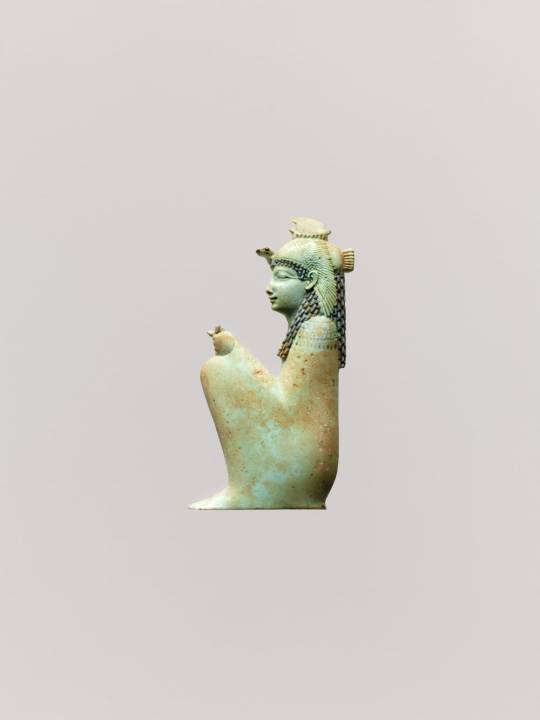
Gbadu -Goddess of fate in Benin, Fon people
Age-Fon - Goddess of hunters, Benin, Dahomey Empire
Achimi - Buffalo goddess, Algeria
Ancient deities share unique names based on their supernatural powers and influence in subject communities. Learning about African goddess names and meanings is useful for child naming. Furthermore, knowing these names helps in explaining ancient
1 note
·
View note
Video
In the same way that Black voices are silenced in the mainstream, it started centuries ago with silencing the essence of African Spiritual systems. It was defined through a Eurocentric and Arabised lens from a religious viewpoint, no effort was made to understand its principles as espoused by them, but rather they had to be fit into the oppressive religions framework! We see this clearly as an example in the conflation of angels or demons or djins which can be benevolent or evil - emissaries of the Almighty God. Yet no such direct correlation exists in African Spirituality because the aspects of Elemental energy present within our physical makeup and the Environment - the Neter, Orisha, Abosom, Nkisi etc don't function in the same way as that of the religious conceptions. When we do not make efforts to comprehensively understand the Ancestral systems, we will also be lacking in our ability to utilise them effectively in living - our HOME-STUDY COURSE; comprising 7-years of research uniting the key principles, dispels all ignorance... Register today: https://ancestralvoices.co.uk/digital-home-study-course/ #understand #understanding #angels #djins #orisha #abosom #neter #neteru #odinani #spirit #spirituality #ancestralvoices #ancestral_voices https://www.instagram.com/p/CdZHjGSDxA0/?igshid=NGJjMDIxMWI=
#understand#understanding#angels#djins#orisha#abosom#neter#neteru#odinani#spirit#spirituality#ancestralvoices#ancestral_voices
11 notes
·
View notes
Video
youtube
Why Sacrifice is Used to Acknowledge Ancestors? - Connecting to Spirit G...
#ancestors#black#Black art#Odinani#Igbo#Igbo Spirituality#Ifa#Black Spirituality#Black Goddess#Ancestral work#Ancestor Altar#ancestral magic#Sacrifice#Esoteric#Spirit Guide#Spirituality#Spiritual#Spiritual Video#Blood#Sacifice#Wicca#Wicca Altar#wicca aesthetic#Conjure#Hoodoo#Obeah#Santeria#nsibidi#cosmic path#path
12 notes
·
View notes
Video
youtube
What is a Dibia? - Healers in Igbo Spirituality Explained
In Igbo the history of the Igbos no title is more important to the advancement of science and spirituality. A Dibia is an individual who's Chi has brought them the calling of healing, learning, and advancing knowledge of the physical and spiritual world - hence the term 'After God There's Dibia'. In this video I explain what a Dibia is, what Igbo people believe makes a Dibia special, how to become a dibia, and how to become an african healer.
5 notes
·
View notes
Text
Ancient Igbo African Gods And Goddesses By SIRIUSUGOART.
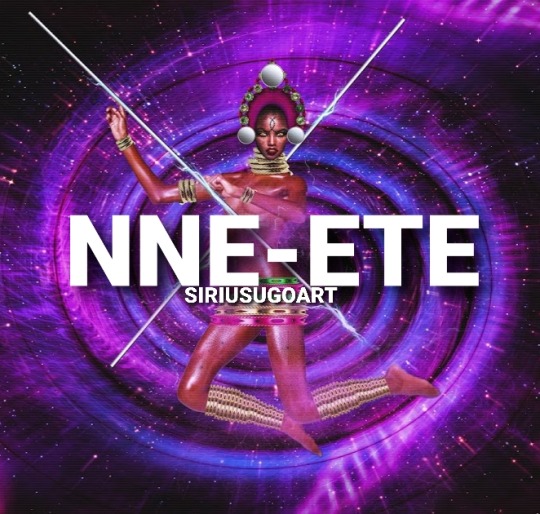
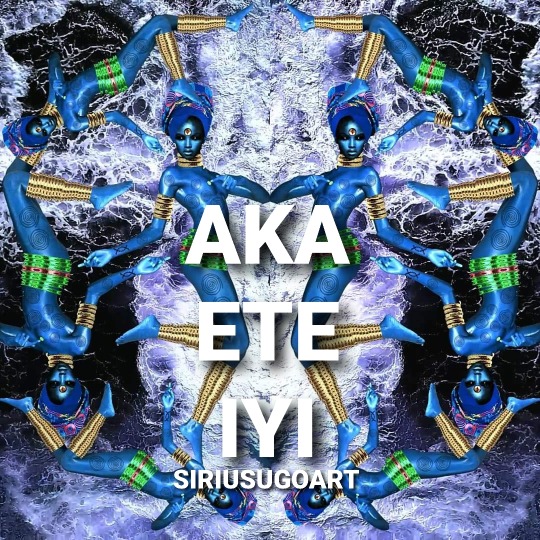
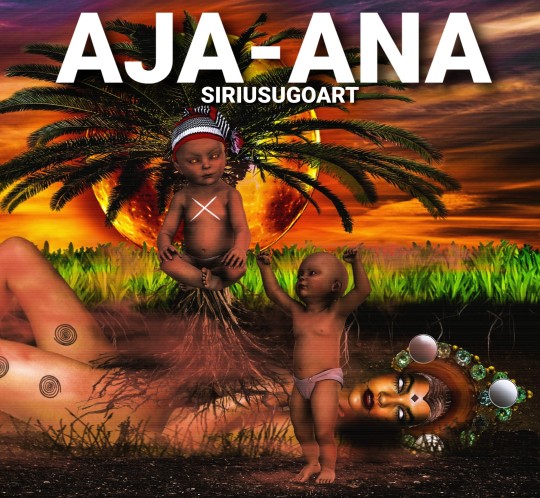
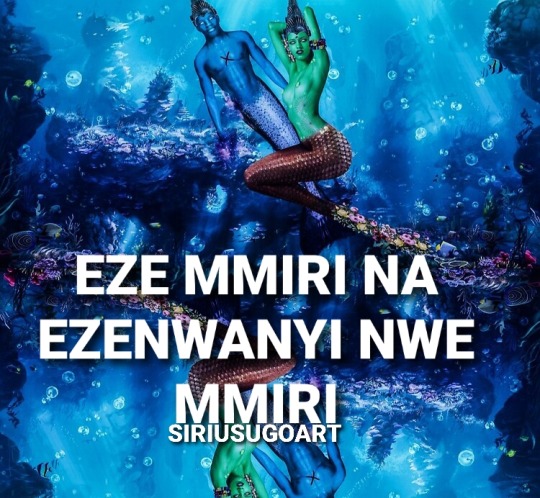
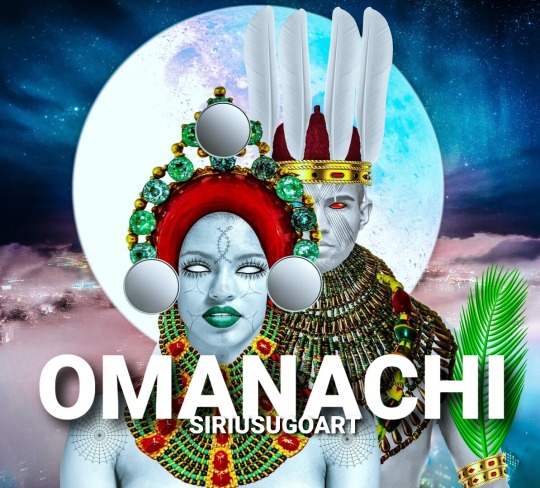
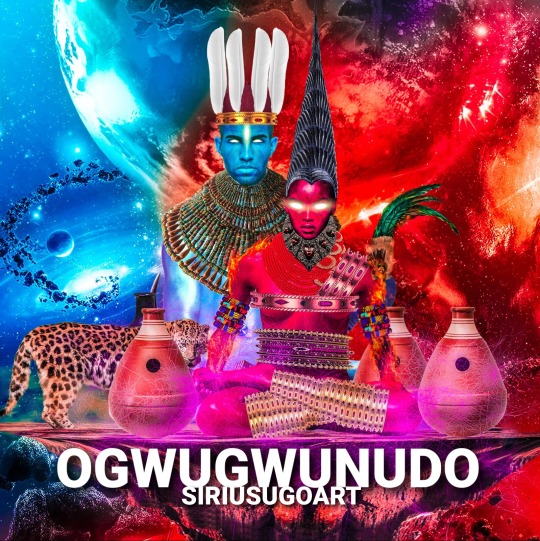
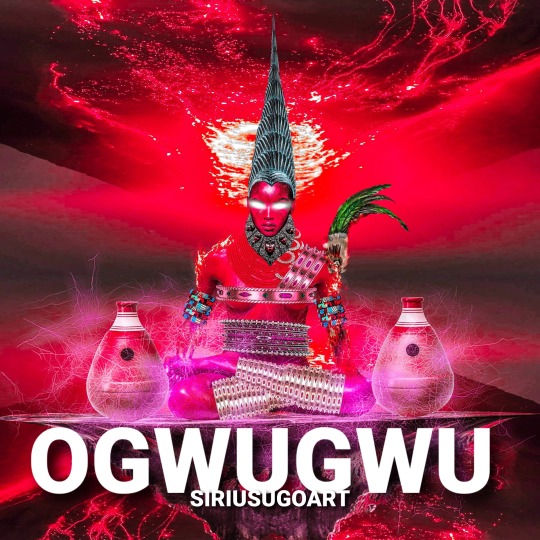
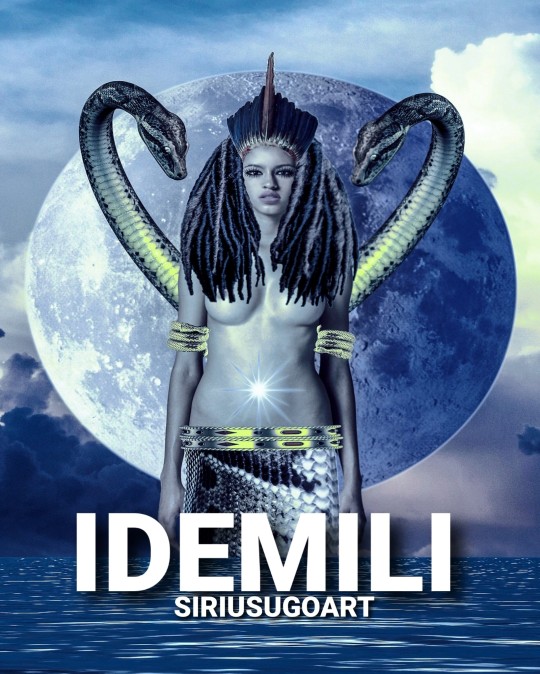
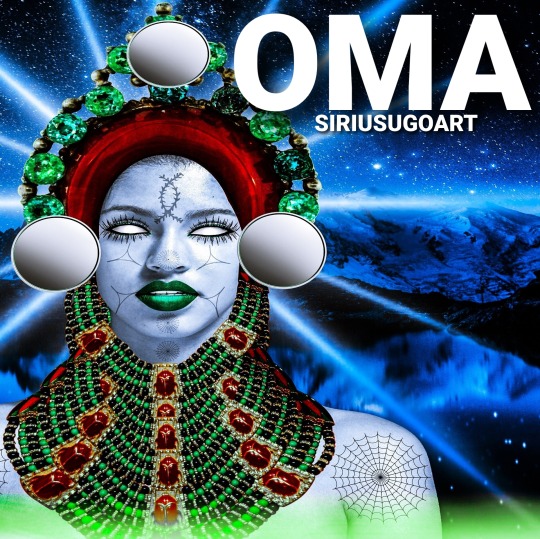
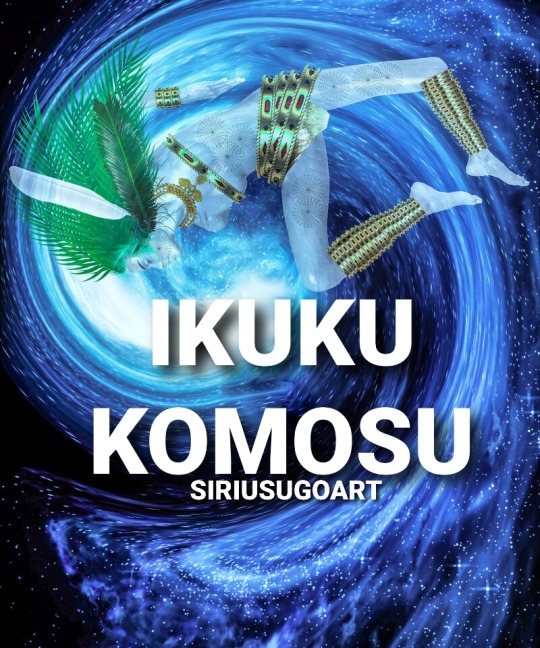
#africa#african#film photography#goddess#afrofuturism#african goddess#igbo#african queen#shotbyugo#african gods#african Spirituality#odinani#black models#black panther#afropunk#igbo deities#Orishas#gods#film#afrocentric#afropop#afrobeats#afrolatina#igbo people#african culture#african art#african mask#alusi#dark beauty#west africa
31 notes
·
View notes